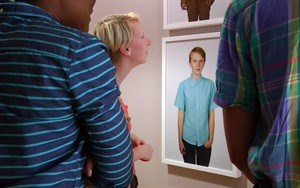
In this photo taken on Monday, April 21, 2014, Foster Noone, 17, of Pelham, Ala., looks at a personal photo in a new exhibit featuring images of young people with varied sexual identities and preferences during the installation of the work in Birmingham, Ala. Self-identified as gender fluid, Noone is among a dozen young people who posed for photos in the exhibit, which opens Wednesday, April 23, at the Birmingham Civil Rights Institute. (AP Photo/Jay Reeves)
April 23, 2014 - 2:37 PM
BIRMINGHAM, Ala. - For many, it's difficult to understand Foster Noone's sexual identity. The 17-year-old uses the labels of bisexual, trans and gender neutral all at once.
A photography exhibition opening at the Birmingham Civil Rights Institute on Wednesday night seeks to put a face on such young people while exploring the difficult dynamics of family acceptance of their identities in the Deep South.
The exhibit "Family Matters" features images of a dozen lesbian, gay, bisexual, transsexual and queer youth ages 15 to 23 who were photographed by Carolyn Sherer. She previously displayed photographs of lesbians and their families for a 2012 show called "Living in Limbo."
Sherer, who photographed each young participant before a plain white background, said she didn't have any trouble finding subjects for the projects, even though living openly as a LGBTQ person can be difficult in Alabama — like many other places.
"The 12 youths who stood for these photographs are fearless, and they give me great hope for the future," Sherer said.
Noone, of suburban Pelham, laughed in delight when viewing the exhibit for the first time with two other people who posed, Ali Massoud and Lauren Jacobs, both of Birmingham.
"With only 12 portraits it's impossible to show the entirety of such a huge community, but I love that it gives voices to young people and it's a start for us to begin telling our stories," Noone added.
Jacobs, who calls herself queer, is one of the older participants, at 22. She hopes the display — hanging in a hallway beside old black-and-white images from the civil rights movement in the 1960s — will be affirming for both the people who posed and for viewers. Beside each photo is a short personal narrative describing that person's relationship with family members.
"I'm actually most interested in what it will change for people who are young queer people who are just coming through the institute with their families and they see people on the wall that they know are them," Jacobs said.
Sherer's showing of photos of lesbian families broke ground two years ago at the museum, which historically has focused on the struggle for equal rights for blacks in Birmingham. The show became the basis for a feature-length documentary, and it inspired Sherer's new project because of the differences she saw between middle-age lesbians like herself and youth in the LGBTQ community.
"What I see in young people now in Birmingham is an optimism I never experienced," said Sherer. "They plan their careers and their families as though they will enjoy full equality."
Sponsored by Birmingham AIDS Outreach and other partners, the show runs through June 9 at the Civil Rights Institute. Sherer is seeking funding for additional national showings.
Ali Massoud, a gay man from Egypt who attends college in Birmingham, said it's important for people to see the diversity of the LGBTQ community.
"It's not just about gays and lesbians," Massoud said. "There are all sorts of trans people, there are all sorts of queer people and people identifying in different ways because of the different experiences that they've had."
While living as an openly gay person is often more difficult in a Bible Belt state like Alabama than somewhere more liberal like California, Massoud said, it's still easier to be out in the South than in his native Egypt.
Massoud, who hopes to reconcile a fractured relationship with his parents, described the tension between his life in the United States in his Muslim upbringing in Egypt in the narrative accompanying his portrait.
"One is my past, one is my present, but I want both to be my future," Massoud wrote.
News from © The Associated Press, 2014